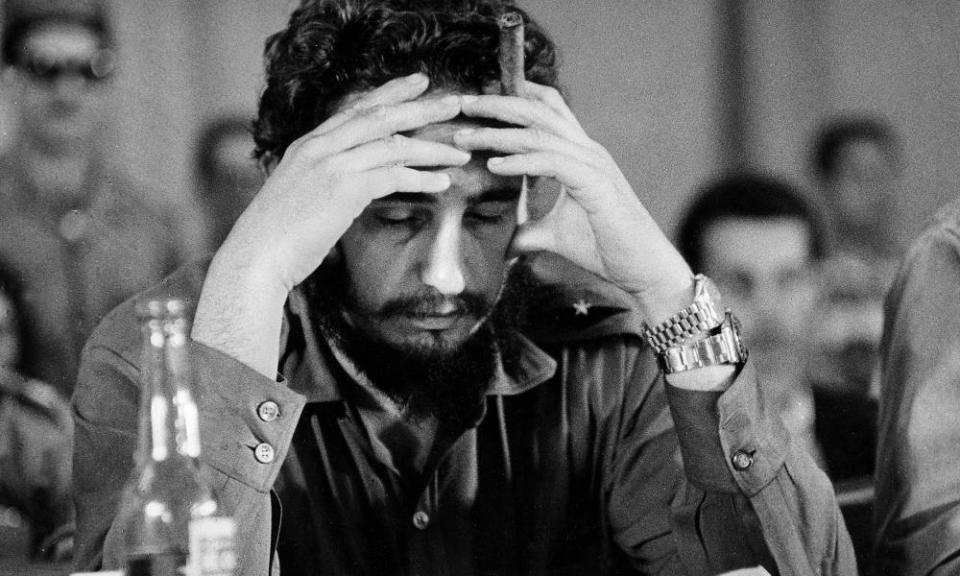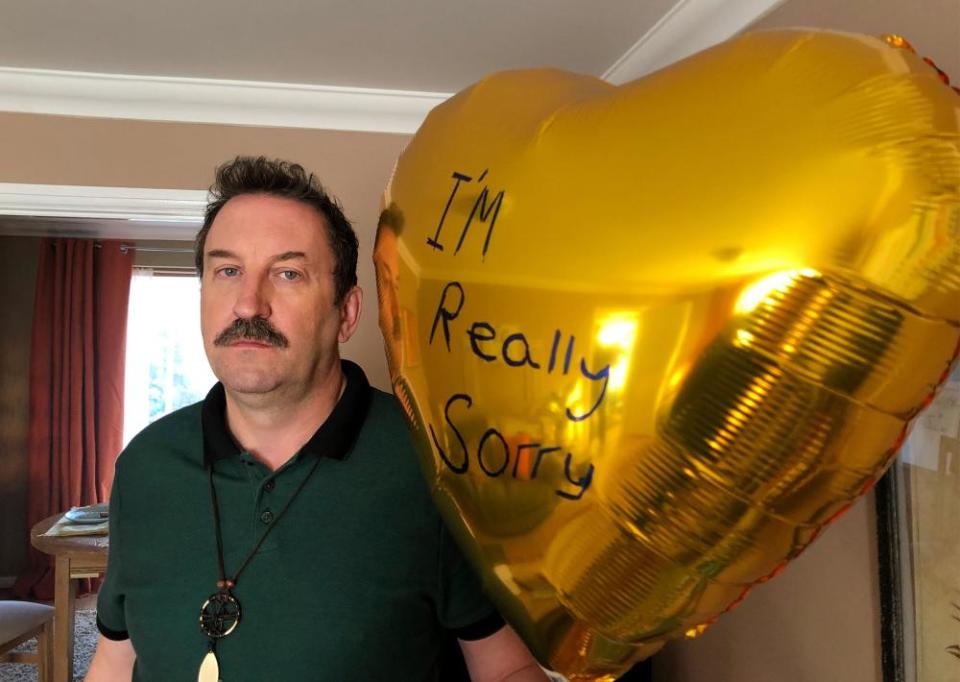The week in TV: Little Birds; Cuba: Castro vs the World; The Talk and more
Little Birds (Sky Atlantic) | sky.com
Cuba: Castro vs the World (BBC Two) | iPlayer
The Talk (Channel 4) | All4
Squeamish About… (BBC Two) | iPlayer
Semi-Detached (BBC Two) | iPlayer
Tangier, 1955; Havana, 1959. Can there have been two sexier settings in the last century, excepting possibly Casablanca, 1941? Certainly I open tentatively my front door, gaze on to cobbles squirming together for shelter under horizontally driving Edinburgh lockdown rain, achingly chill for August, and race back in to see the cars, the bars, the colours, the style, the laces and the braces; the sun, ever that fat sun: and see my perfect unlived life. Possibly without all the flies and guns and death and stuff.
First to Tangier and Sky Atlantic’s Little Birds, a sensual rather than (so far) overtly sexual six-part adaptation of Anaïs Nin’s collection of erotic short stories. Lucy Savage is a young American deb fleeing her uptight, thin-lipped mother and quite shameless arms-dealer father for a marriage, and to a lord no less, back in the days when that almost meant something, in troubled gorgeous bougainvillea’d Tangier. “She’s smarter than me, prettier than me, richer than me,” whined her beau, Lord Hugo. He might have added “and significantly less sexually confused than me”, for Tangier in the 50s was renowned to value liberty of love way higher than hypocrisy, and we’ve just seen him writhing sandily in the dunes with a man.
It’s a little heavy-handed on the symbolism: Lucy, a fine Juno Temple, complete with to-die-for shades in every new scene, is about to gain her liberation, just as Morocco is about to get hers. One will take place in rebellion against French arrogance; one amid the casbahs and the kaftans, the perfume and the lipstick. It’s hard to see quite where it’s going, other than to get Lucy a few shags, and dim, repressed Hugo into trouble peddling guns for her daddy in that tinderbox. We’ll have, I suspect, fun along the way though: most of the acting is rather good, the whole is superbly stylish, and it’s grand to see actors Hugh Skinner and Nina Sosanya reunited, though it’s a very long way from mockumentary W1A. Sosanya always surprises with sheer versatility; here, as Lili von X, she’s a gleeful little tower of lubricious, with flawless fast French.
Next stop New Year’s Day 1959, and the entirely nonfictional, fascinating tale, brought to wonderful life by Norma Percy and the Brook Lapping team, with unprecedented access to spies and presidents and (almost) popes, of Fidel Castro’s unparalleled political nous.
The first instalment of the BBC’s two-part Cuba: Castro vs the World rehearsed, though never less than intriguingly, the Bay of Pigs, and how Fidel had played both the Russians and the Americans and only half-lost: of his and Che Guevara’s drive to liberate the world from imperialism (Algeria, Angola, Bolivia) from a tiny island 90 miles off Florida, with the upsides only of a loyal, cohesive (crucially non-tribal) population, feisty guerrillas and hefty Russki funding. Later it truly comes alive, by showcasing the gulfs between capitalism and… any other conceivable model. Post-Batista, a triumphant Fidel was soon in Washington, meeting Vice-President Nixon. Tricky Dicky, deeply unimpressed at his wearing of battle fatigues, proceeded to lecture him at length on the dangers of communism. There have been historical figures more adept at learning to, in the modern phrase, “read the room”.

And my goodness, didn’t he really get under the skin of a certain William Jefferson Clinton, who still blames Castro and the Mariel boatlift/resettlement for having lost him the governorship of Arkansas. That might explain why, 13 years later as president, and even as the US was in the first flutterings of lifting sanctions against Cuba, the American mood and heart not really being in it any more for full-time commie-hating, he stood staunch.
Lee Mack is a new dad, caught in various unfunny moments, and wouldn't have been out of place in the 1970s. 1770s even
It wasn’t until another Democrat was in the White House that that was allowed to change. Barack Obama, with a certain pluck and, I hadn’t fully realised until this searing programme aired, secret and crucial brokering by Pope Francis, began from 2009 to ease sanctions against (now) Raúl Castro, recognising the era had changed. In the worst years after Soviet collapse, penniless Cubans were frying grapefruit skins as steaks, chewing floor mops. No more: in 2016, Obama tweeted “¿Que bolá Cuba?” as he landed, the first POTUS to visit the island in almost a century.
Within months of his election in turn, Donald Trump had announced his proud intention to reverse that “Cuban thaw”. What a scamp! Sheesh, the more you learn about that guy, the less there is to just love…
Channel 4’s The Talk was a skilfully done and constantly surprising exploration of the discussion black mothers and fathers have to have with their young children about the small and large instances of racism they’ll encounter in Britain. Featuring the likes of Emeli Sandé, Lennie James, the towering intellect that is Gary Younge, Leigh-Anne Pinnock from Little Mix, rugby union’s Maro Itoje, and various dancers and rappers, we got some appalling stories, such as TV presenter Rochelle Humes recalling that she couldn’t go to the party of a schoolfriend because of her colour. She tried that night to scrub her skin off in the bath.
We also got humour and insight. And one thing that struck is how times have changed: where once there was open racism on the streets and in thoughts, now it is insidious and weaselly. And some of these parents have now to decide whether they just repeat the talk their own parents gave them or, in the face of children pointing out that a fair heft of their friends are white, temper the talk to stop them seeing enemies at most turns – or, worse, rob them of the idea they have every right imaginable to achieve the same, or, even worse, consign them to a life of an awareness of victimhood. Lennie James’s impassioned tale of flying back from the Caribbean and suddenly having to put on his weary mental armour once again at Heathrow will linger long.
We had two new BBC Two comedies for some established funny folk. I employ the term “comedy” as elastically as a clown’s waistband. The Squeamish About… thing, from Matt Berry and Arthur Matthews, is a screwball take on Britain’s recent culture – entertainment, relationships, etc – with archive 60s cuts and pompously overenunciated voiceover. At its very best, which is still not really saying anything special, this mix of old footage and archly knowing fake-news voiceover can result in a bark of involuntary laughter, pretty swiftly forgotten. At its worst it simply consists of inserting some random “funny” word, gusset or goat or some such, into the voiceover, or captioning some working-class person Mrs Nora Eels. The Pythons did it first, about 150 years ago. But it’s neatly enough done, moves wonderfully fast.

And it’s worlds better than Semi-Detached. The 2019 pilot of this show has been, quite unaccountably, commissioned for a series. Lee Mack, Ellie White, Patrick Baladi, hang thy heads. It’s worse than just not funny: it makes me feel anxious. Lee is a frantic new dad, caught in various slapsticky unfunny moments, between neighbouring snobs and a new age holistic wife, and wouldn’t have been out of place in the 1970s. 1770s even. It makes me feel itchy and angsted and troubled about the future – mine, yes, but more pertinently that of BBC Two’s “comedy” supremo.


